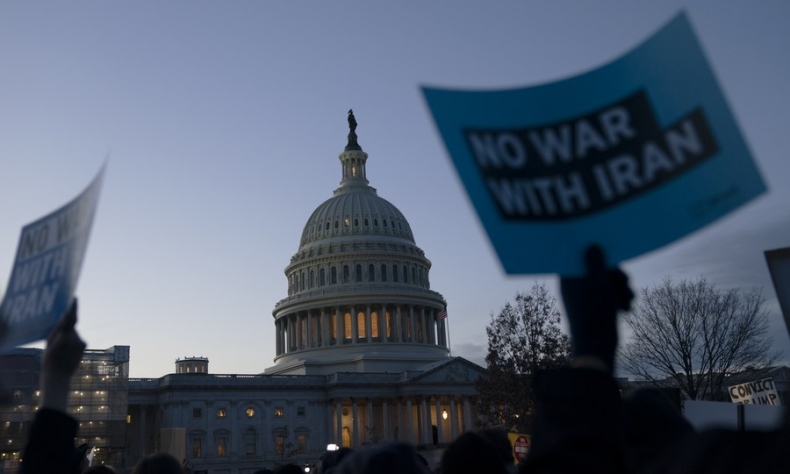Why European Countries Oppose US on Iran Nuclear Issue

EU is opposed to the U.S. not only on the Iran nuclear issue but also on a variety of issues, including U.S. withdrawal from UNESCO, quitting climate change agreement and quitting WHO.
The last few months have seen strong opposition from the international community in general to the U.S.’s efforts to extend the arms embargo on Iran. The opposition from major European countries, including France, Germany and Britain, was particularly noticed in the media. The EU countries’ positions in this regard have served to maintain the stable evolution of the Iran nuclear issue.
On August 14 and 21, major European members of the UN Security Council rejected a resolution to extend the arms embargo and a snapback mechanism to sanction Iran.
On August 20, the foreign minister of France, Germany and Britain issued a joint statement expressing their opposition to the extension. Important EU states, together with other major representatives of the Joint Comprehensive Plan of Action (JCPOA), except the U.S., will participate in the meeting of the Joint Commission on the Iran nuclear agreement due to take place on September 1 in Vienna. The Joint Commission will be chaired on behalf of EU High Representative Josep Borrell by Secretary General of the European External Action Service (EEAS) Helga Maria Schmid.
The EU, by its explicit opposition to U.S. policy on the Iran nuclear deal, has expressed its dissatisfaction with the U.S. for its withdrawal from the JCPOA two years ago and its position to safeguard the nuclear deal as well.
The EU certainly has multiple reasons for holding its above-mentioned positions. First, the EU is dissatisfied as it has not harvested the economic benefits expected from the nuclear deal. The EU countries regard Iran as a major economic partner with a population of over 80 million, which means both business profits and job opportunities for its citizens. Economic slowdown and depression in the last decade have made Iran a crucial market.
But Trump administration’s withdrawal from the JCPOA and restoration of sanctions threatens the EU’s prospect of economic cooperation with Iran. Although the EU created the Instrument in Support of Trade Exchanges (INSTEX) to solve the payment problem, the instrument has not served to reverse the situation, and EU-Iran economic relations have been reduced to a minimal level.
Second, the EU regards the United States’ withdrawal from the JCPOA as undermining its reputation. The EU has long been a leader in the negotiations among relevant parties for the JCPOA. For about twelve years from 2003 till 2015, EU High Representatives for Security and Foreign Affairs had worked hard to bring parties to the negotiation table.
The EU believes that its normative diplomacy featuring dialogue and negotiation is the right approach for solving problems, including those in the Middle East. Moreover, the JCPOA had been regarded as a typical success story for its normative diplomacy and as a signature achievement in this regard.
By withdrawing from the JCPOA, Trump administration undermined the EU’s efforts in the Iran nuclear issue, spoiled its achievement, and harmed the EU’s reputation as an effective broker of international disputes.
Actually, the EU has previously demonstrated its opposition to the U.S. on this issue, and EU-U.S. division on the Iran nuclear issue has existed for a long time. The EU has frequently, and for several years, expressed its disagreement with the U.S.’s withdrawal from the nuclear deal. In January 2019, EU leaders and foreign ministers of France and Germany boycotted the conference held in Warsaw for the purpose of launching the strategy to confront Iran.
The EU’s opposition to the U.S. policy in this regard will also be significant in maintaining the stable evolution of the Iran nuclear issue. The U.S.’s withdrawal from the nuclear deal and its resumption of unilateral sanctions have destroyed one of the two tracks of the nuclear deal. Iran proclaimed not to implement a significant part of its commitments in the JCPOA but has refrained from withdrawing from the deal. The reasons lie largely in the EU’s support for the JCPOA in addition to the backing of China and Russia. If Iran announces its withdrawal from the deal, the other track, too, will have stalled.
The EU has reasons for opposing U.S. unilateralism on this issue, and this opposition is critical in maintaining the JCPOA.
Last but not least, the EU’s opposition to the U.S. policy regarding the JCPOA is only one part of its struggle against unilateralism. In fact, the EU is opposed to the U.S. not only on the Iran nuclear issue but also on a variety of issues, including U.S. withdrawal from UNESCO, quitting climate change agreement and quitting WHO. This suggests that even its allies sharing the same values are not satisfied with its unilateralism.
Jin Liangxiang is Senior Research Fellow with the Center for West Asian and African Studies, Shanghai Institutes for International Studies.
 Facebook
Facebook
 Twitter
Twitter
 Linkedin
Linkedin
 Google +
Google +










